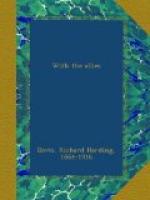On August 23 we set forth from Brussels in a taxicab to find out. At Hal, where we intended to abandon the cab and continue on foot, we found out. We were arrested by a smart and most intelligent-looking officer, who rode up to the side of the taxi and pointed an automatic at us. We were innocently seated in a public cab, in a street crowded with civilians and the passing column of soldiers, and why any one should think he needed a gun only the German mind can explain. Later, I found that all German officers introduced themselves and made requests gun in hand. Whether it was because from every one they believed themselves in danger or because they simply did not know any better, I still am unable to decide. With no other army have I seen an officer threaten with a pistol an unarmed civilian. Were an American or English officer to act in such a fashion he might escape looking like a fool, he certainly would feel like one. The four soldiers the officer told off to guard us climbed with alacrity into our cab and drove with us until the street grew too narrow both for their regiment and our taxi, when they chose the regiment and disappeared. We paid off the cabman and followed them. To reach the front there was no other way, and the very openness with which we trailed along beside their army, very much like small boys following a circus procession, seemed to us to show how innocent was our intent. The column stretched for fifty miles. Where it was going we did not know, but, we argued, if it kept on going and we kept on with it, eventually we must stumble upon a battle. The story that at Hal there had been a fight was evidently untrue; and the manner in which the column was advancing showed it was not expecting one. At noon it halted at Brierges, and Morgan decided Brierges was out of bounds and that the limits of our “environs” had been reached.
“If we go any farther,” he argued, “the next officer who reads our papers will order us back to Brussels under arrest, and we will lose our laissez-passer. Along this road there is no chance of seeing anything. I prefer to keep my pass and use it in ‘environs’ where there is fighting.” So he returned to Brussels. I thought he was most wise, and I wanted to return with him. But I did not want to go back only because I knew it was the right thing to do, but to be ordered back so that I could explain to my newspapers that I returned because Colonel This or General That sent me back. It was a form of vanity for which I was properly punished. That Morgan was right was demonstrated as soon as he left me. I was seated against a tree by the side of the road eating a sandwich, an occupation which seems almost idyllic in its innocence but which could not deceive the Germans. In me they saw the hated Spion, and from behind me, across a ploughed field, four of them, each with an automatic, made me prisoner. One of them, who was an enthusiast, pushed his gun deep into my stomach. With the sandwich still




